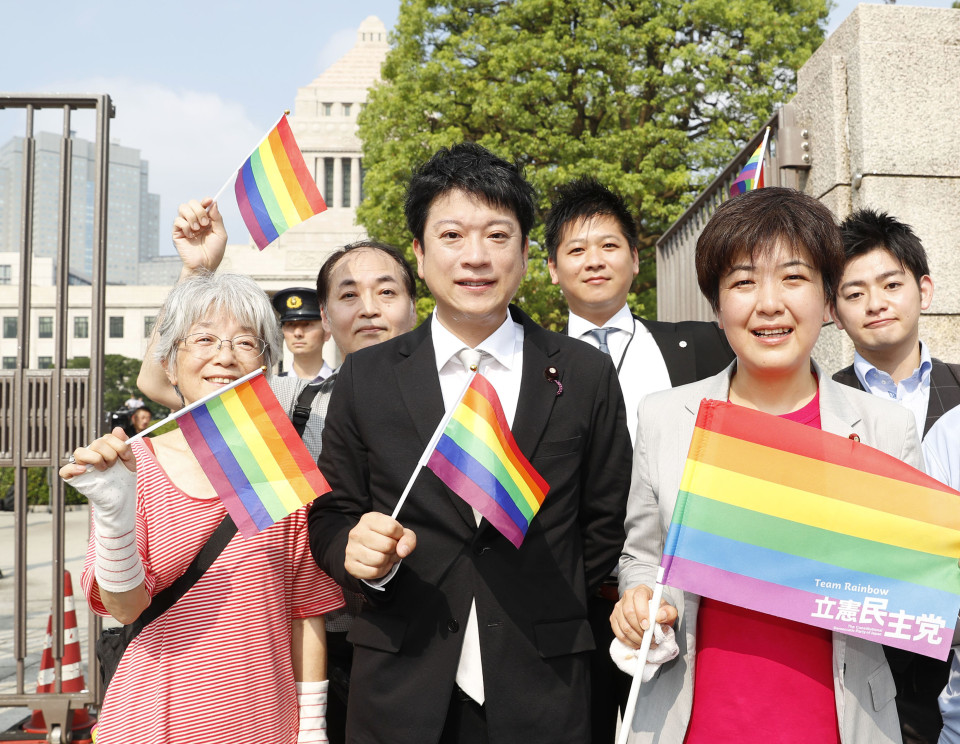Discriminatory remarks made against sexual minorities by a now-sacked aide to Japanese Prime Minister Fumio Kishida sparked fury and worry in the country on Saturday, a day after they were made public.
Civic groups, members of the public interviewed on the streets, people posting online and opposition party lawmakers lambasted Masayoshi Arai for saying that he would "not want to live next door" to an LGBT couple and that he does "not even want to look at them."
He also said that recognizing same-sex marriage in Japan would "change the way society is" and that "quite a few people would abandon this country."
Although Arai's remarks were made during an off-the-record conversation with reporters on Friday, Kyodo News decided to attribute the comments to him in consideration of the public interest over a highly discriminatory statement made by a close aide to the prime minister.
The 55-year-old, who is one of Kishida's executive secretaries, apologized for the comments after they were reported later in the day and retracted them.

Yuichi Kamiya, secretary general of the Japan Alliance for LGBT Legislation, told Kyodo News, "I am horrified by the fact that a person involved in making rules that affect all citizens thinks that way," and urged for the drawing up of legislation banning discrimination against sexual minorities.
Contrary to the stance of the central government, an increasing number of Japanese municipalities have been recognizing same-sex partnerships in recent years. The number of municipalities doing so has grown from six in June 2017 to 255 as of January this year, according to the nonprofit organization Nijiiro Diversity.
Soshi Matsuoka, head of "fair," a sexual minority support group, said, "Japan does not have the right to hold the summit in Hiroshima," referring to this year's Group of Seven summit, which will be hosted by Japan in May.
"As the only G-7 member where legal measures for sexual minorities have not progressed, the country will face even more severe scrutiny from the international community due to the straightforward discriminatory remarks," Matsuoka said.
Near JR Shimbashi Station in Tokyo on Saturday, passers-by strongly criticized Arai, with one 48-year-old woman calling the comments "so terrible that I cannot speak."
"These statements upset everyone. Maybe I might have been an LGBT person as well. How can he say something like this?" she asked.
暗い朝ゴミ出しの帰りに会うなんて俺も嫌だよ、秘書官。言った者の違いは、俺の家庭は国勢調査にカウントされず、変えられない属性ゆえクビになっても文句は言えず、法的保障上は存在しないという事、等々。「誤解を与えるような表現」じゃなくて人々の尊厳と安寧を脅かす暴言https://t.co/XoqQcwclvZ
— ロバート キャンベル (@rcampbelltokyo) February 3, 2023
"It's unthinkable that these remarks were made especially at a time when diversity is considered so important," fulminated a 46-year-old man from Yokohama.
A 50-year-old woman from Osaka Prefecture on a business trip to Tokyo said people of her acquaintance "naturally accept" the existence of sexual minorities. But she also said that some in older generations including her parents are less tolerant, expressing hope their attitudes will change even if it takes time.
Meanwhile, in the shopping arcade of Tenjin in Fukuoka city, southwestern Japan, a 14-year-old junior high school student said she has two friends who are part of the LGBT community. "Everyone interacts with them normally. It's only natural (for Arai) to quit," she added.
Online, LGBT people expressed concern that the remarks by a high official in government could be used to excuse discrimination.
Japanese literature scholar and TV personality Robert Campbell, who is gay, tweeted his anger and dismissed Arai's apologies.
The official's remarks were "not 'expressions that gave a false impression.' They were abusive words that threaten people's dignity and peace," he wrote.
A gay member of the House of Councillors, Taiga Ishikawa, called the situation "beyond one's patience" on Twitter and noted that Arai had also said that all of Kishida's executive secretaries are against same-sex marriage.
The lawmaker of the Constitutional Democratic Party of Japan called for the entire team of secretaries to be dismissed and said he would pursue the matter at the next Diet session.
Kenta Izumi, leader of the main opposition party, said Arai's remarks were "terrible" and that his dismissal was "a matter of course." He added the issue raised questions about how much sensitivity there is toward human rights issues at the Prime Minister's Office.
Related coverage:
Japan PM sacks close aide for his anti-LGBT remarks










